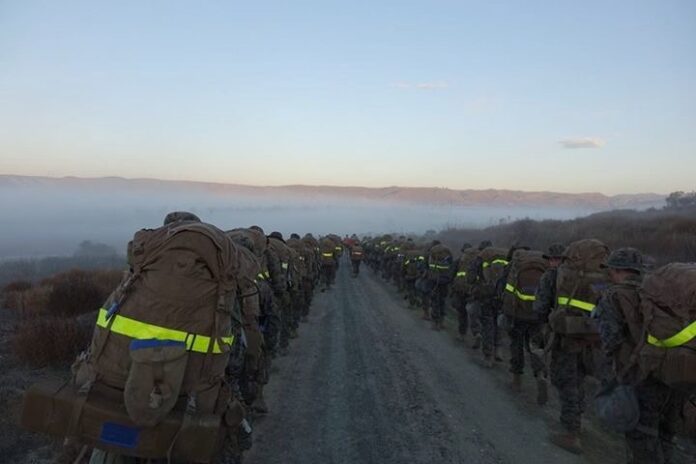There is no question that every branch of the armed forces is facing manning difficulties. With low retention rates and jobs needing to be filled, recruiters are given the task of meeting these quota demands and getting eligible Americans to join. Students often see this happening in their emails – recruiters, armed with sign-up bonuses and rhetoric of adventure and fulfillment, try to entice students to enlist or commission as an officer. Many of us students that are veterans use the benefits that were promised to us to attend UNLV; however, these recruiter emails do not always show the reality of military service that we experienced, and students that are interested should seriously consider if military service is right for them.
One email sent from a Marine Corps recruiter reads, “Has your first time since graduating left you feeling unfulfilled? Are you still in College and wish you had a job that gave you a sense of purpose and an immense challenge, day-in and day-out?” Rhetoric such as this might capture the attention of some students, especially when complemented with all the potential benefits and sign-on bonuses. But some veterans think that recruiters aren’t being completely upfront with what they’re selling.
“I was very fortunate to have a recruiter that didn’t sugarcoat the truth of military life to me,” says Navy veteran-student Israel Jara. “But the reality of the situation is that it seems there are more recruiters who sell fantasy to people. It’s a common joke in the military,” continued Jara. “There were positives that I gained: discipline, focus and friendships that will last a lifetime. But I also developed debilitating anxiety, which makes some days harder than they should be.”
“Military life was stressful on my family, my personal life,” says veteran Kerry Facen. “It’s not meant for everyone.I remember people quitting boot camp after they realized what they signed up for. It’s better if people know how demanding and consuming the military is before joining.”
Per a 2023 Congressional Research Service memo, the U.S. armed forces currently has 1,328,000 active duty personnel throughout the branches, with another 799,500 personnel in the reserves. The branches have been able to retain their service members at an adequate percentage of those who are already in, but the problem the military faces is recruiting civilians into the military. In 2022, the Army failed to meet its recruitment goal by 15,000.
There are many reasons for why Americans are not signing up for military service. After costly and long wars in Iraq and Afghanistan, many Americans have apprehensions towards the military and foreign policy decisions. A 2023 Gallup poll shows that only 60 percent of Americans have confidence in the military, which is the lowest in 20 years. Many Americans are also unable to meet military standards, from obesity, criminal records or other medical disqualifications. In 2022, Army chief of staff General James McConville stated before Congress that only 23 percent of Americans, ages 17-24, are qualified to serve. With a pool of eligible candidates for military service dwindling, and nonetheless having to meet quotas, recruiters use any available resource to get the attention of civilians.
Students often wonder how they end up receiving emails from military recruiters. The Family Educational Rights and Privacy Act, or FERPA, is a law that protects the privacy of student education records. However, the Solomon Amendment, passed in 1996, dictates that schools must give up student information for military recruiting in order to keep receiving federal funding or research grants. The Department of Education determined that the Solomon Act supersedes FERPA law, and now military recruiters are granted access to student education records for contact information.
Recruitment has also expanded into the streaming space as well. In 2019, the Army created an account on the Twitch streaming service, with their esport team playing popular video games in an attempt to attract young Americans into potentially signing up. This tactic of recruitment drew heavy criticism when the channel created fake giveaway links which would redirect to recruitment pages. After the public uproar, the Army stopped streaming, until the account returned in 2020.
Military recruiters are not just trying to get people to join on active duty contracts. Many students will receive emails or texts about the reserves. “I just wanted to reach out to see if anyone has spoken with you about the Navy Reserves,” reads a text from a Navy Petty Officer. “The Reserves are offering $20,000 for 3 years… you only drill once a month at Nellis!” Part of the allure of joining the reserves is that you get partial military benefits and only drill once a month, and the rest of the time you keep your civilian life. However, this is not the full truth, as reserves do get deployed. The reserves and National Guard made up almost half the total number of troops that were sent to Iraq and Afghanistan. Even though reserve life can allow one to maintain aspects of civilian life, the potential of being uprooted and sent on a deployment is always possible.
The military can offer a career path for some and has its benefits. There are jobs that provide technical training and on-the-job experience which have high-paying civilian counterparts. The Post-9/11 GI Bill can be used to pursue education for the service member or be passed to their children. Many veterans, like the ones interviewed for this article, recognize the positives that military service gave to them. But before you reply to a recruiter’s random email that you’re interested in signing up, be mindful of predatory recruitment tactics that are not always honest with the realities of military life.

